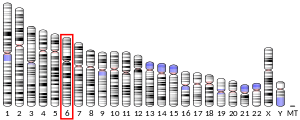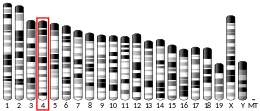FBXL4
F-box and leucine-rich repeat protein 4 is a protein that in humans is encoded by the FBXL4 gene.[5]
Structure
This gene encodes a member of the F-box protein family which is characterized by an approximately 40 amino acid motif, the F-box. The F-box proteins constitute one of the four subunits of ubiquitin protein ligase complex called SCFs (SKP1-cullin-F-box), which function in phosphorylation-dependent ubiquitination. The F-box proteins are divided into 3 classes: Fbws containing WD-40 domains, Fbls containing leucine-rich repeats, and Fbxs containing either different protein-protein interaction modules or no recognizable motifs. The protein encoded by this gene belongs to the Fbls class and, in addition to an F-box, contains at least 9 tandem leucine-rich repeats.[5]
Clinical significance
Mutations in this gene cause early-onset mitochondrial encephalomyopathy.[6][7]
References
- 1 2 3 GRCh38: Ensembl release 89: ENSG00000112234 - Ensembl, May 2017
- 1 2 3 GRCm38: Ensembl release 89: ENSMUSG00000040410 - Ensembl, May 2017
- ↑ "Human PubMed Reference:".
- ↑ "Mouse PubMed Reference:".
- 1 2 "Entrez Gene: F-box and leucine-rich repeat protein 4".
- ↑ Gai X, Ghezzi D, Johnson MA, Biagosch CA, Shamseldin HE, Haack TB, Reyes A, Tsukikawa M, Sheldon CA, Srinivasan S, Gorza M, Kremer LS, Wieland T, Strom TM, Polyak E, Place E, Consugar M, Ostrovsky J, Vidoni S, Robinson AJ, Wong LJ, Sondheimer N, Salih MA, Al-Jishi E, Raab CP, Bean C, Furlan F, Parini R, Lamperti C, Mayr JA, Konstantopoulou V, Huemer M, Pierce EA, Meitinger T, Freisinger P, Sperl W, Prokisch H, Alkuraya FS, Falk MJ, Zeviani M (Sep 2013). "Mutations in FBXL4, encoding a mitochondrial protein, cause early-onset mitochondrial encephalomyopathy". American Journal of Human Genetics. 93 (3): 482–95. doi:10.1016/j.ajhg.2013.07.016. PMC 3769923. PMID 23993194.
- ↑ Bonnen PE, Yarham JW, Besse A, Wu P, Faqeih EA, Al-Asmari AM, Saleh MA, Eyaid W, Hadeel A, He L, Smith F, Yau S, Simcox EM, Miwa S, Donti T, Abu-Amero KK, Wong LJ, Craigen WJ, Graham BH, Scott KL, McFarland R, Taylor RW (Sep 2013). "Mutations in FBXL4 cause mitochondrial encephalopathy and a disorder of mitochondrial DNA maintenance". American Journal of Human Genetics. 93 (3): 471–81. doi:10.1016/j.ajhg.2013.07.017. PMC 3769921. PMID 23993193.
Further reading
- Ilyin GP, Rialland M, Pigeon C, Guguen-Guillouzo C (Jul 2000). "cDNA cloning and expression analysis of new members of the mammalian F-box protein family". Genomics. 67 (1): 40–7. doi:10.1006/geno.2000.6211. PMID 10945468.
- Cenciarelli C, Chiaur DS, Guardavaccaro D, Parks W, Vidal M, Pagano M (Oct 1999). "Identification of a family of human F-box proteins". Current Biology. 9 (20): 1177–9. doi:10.1016/S0960-9822(00)80020-2. PMID 10531035.
- Winston JT, Koepp DM, Zhu C, Elledge SJ, Harper JW (Oct 1999). "A family of mammalian F-box proteins". Current Biology. 9 (20): 1180–2. doi:10.1016/S0960-9822(00)80021-4. PMID 10531037.
- Van Rechem C, Black JC, Abbas T, Allen A, Rinehart CA, Yuan GC, Dutta A, Whetstine JR (Sep 2011). "The SKP1-Cul1-F-box and leucine-rich repeat protein 4 (SCF-FbxL4) ubiquitin ligase regulates lysine demethylase 4A (KDM4A)/Jumonji domain-containing 2A (JMJD2A) protein". The Journal of Biological Chemistry. 286 (35): 30462–70. doi:10.1074/jbc.M111.273508. PMC 3162406. PMID 21757720.
- Kipreos ET, Pagano M (2000). "The F-box protein family". Genome Biology. 1 (5): REVIEWS3002. doi:10.1186/gb-2000-1-5-reviews3002. PMC 138887. PMID 11178263.
This article incorporates text from the United States National Library of Medicine, which is in the public domain.



